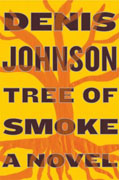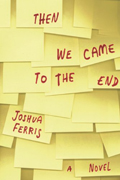
The Morning News Tournament of Books, sponsored by Powell’s Books, is an annual battle royale amongst the top novels in “literary fiction” published throughout the year. Read more about this year’s tournament »
» Buy the Books at Powells.com «
» Meet This Year’s Judges «
» Wager for Charity «
» Relive the Action: ’07, ’06, ’05 «
» Contact the Tournament Staff «
• SEMIFINALS • MATCH ONE •
March 25, 2008
 |
Tree of Smokeby DENIS JOHNSON |

|
| v. | ||
Then We Came to the Endby JOSHUA FERRIS |
judged by GARY SHTEYNGART
I spend most of my productive time bemoaning the collapse of literature, the death of writing, the death of reading, death, death, death. So what am I to make of the year 2007? Three books from this year are going to have a shelf life up to and maybe even beyond the collapse of our own civilization. One about Dominican immigrants, one about the Vietnam War and one about office life. Junot Díaz, Denis Johnson, Joshua Ferris. These are not books, these are entire atmospheres, entire modes of thinking, entire vernaculars. And now I’m supposed to choose between Ferris and Johnson. Why me?
To be honest, when the Rooster people told me I was supposed to read Johnson’s Tree of Smoke, a 614-page book about the Vietnam-freaking-War, I got all huffy. (Full disclosure: I eat pho about once a month, a good friend of mine dated a Vietnamese girl pretty seriously, and I once flew over Vietnam on the way to Bangkok.) Here we go, I thought. Here come the innocent grunts being blown to bits, the cynical officers, the hookers with crying babies, the water buffaloes lazily lifting their ears as the whirlybirds above them strafe every conical hat in sight. Yes, Tree of Smoke has all that. But it also has an American soldier tearing out a Vietnamese prisoner’s eyeball so that it dangles by the optic nerve, then turning it around so that he can watch himself be tortured to death. This thing makes the Southeast Asia of Apocalypse Now look like Grenada.
It is also literally impossible to turn away from this book, even when the plot makes zero sense. The Johnsonian dialogue is there, terse and brutal and real, and then there’s the molecular evocation of time and space that made me sweat with jungle humidity. Did Tree of Smoke force me to think hard about wars and the hopelessness of working-class young American males and optic nerve damage and all that? Yes. But listen, this book is something else, too. It’s an entertainment, as gripping as anything those old 19th-century writer dudes used to crank out, only crafted with exacting 21st-century precision. If I could give up a month of my life, I’d read it all over again.
When the Rooster people told me I was supposed to read Joshua Ferris’s Then We Came to the End, I was, like, “Goddamn you all to hell.” I had already started reading it and the central conceit of the book—an omniscient “we” that hovers above a failing Chicago ad agency, gently and not-so-gently touching upon the lives of its many troubled workers—just wasn’t doing it for me. But as the pages piled up, I realized what I fool I was. How quickly had I discounted the tragedy of the American workplace (which, by the way, is about to get another excellent treatment in Ed Park’s first novel, Personal Days), how little I understood the centrality of said workplace in the lives of almost everyone I know, and how little I trusted that Ferris could show us the collective mentality of the office while imbuing each worker with so much individuality and grace. This is such a generous author that one is tempted to borrow as much as $8,000 from him and then never give it back. By the time the novel reaches its middle section, where the “we” is dropped to explore the life of one of the agency’s partners who is suffering from breast cancer, you find yourself airlifted into one of the most humane and sympathetic books of the last decade. But it’s not all cancer and jammed copiers. A novel whose most romantic character is named Benny Shassburger should clue you into the book’s abundant (and rather graceful) humor, another way in which Ferris manages to do the impossible: to turn workaday hell into a gripping page-turner.
Ferris or Johnson? Johnson or Ferris? Shit, I don’t know. How do you chose between two excellent novels that have nothing in common, other than the fact that they make you believe in the whole enterprise of literature again? In the end, I’ll give it to Ferris because the last three sentences in his book made me drop my bahn mi, made me run crying for the toilet as life strafed from me above.
• About the Judge •
• From the Booth •
| Tomorrow’s match-up is between finalists for the National Book Critics Circle Award. Is it possible the Rooster could pull off two major award reversals in two days? | Kevin | John | The young upstart, Ferris, makes it to the Zombie Round. He needs to be careful, though. No less than Thomas Pynchon got knocked out there last year. |
» Read Kevin Guilfoile & John Warner’s commentary on the match «

» DOWNLOAD THE BRACKETS «
• Round One •
Tree of Smoke v. Ovenman
judged by Tobias Seamon
The Savage Detectives v. Let the Northern Lights Erase Your Name
judged by Elizabeth Kiem
Then We Came to the End v. Petropolis
judged by Anthony Doerr
You Don’t Love Me Yet v. New England White
judged by Jessica Francis Kane
Run v. Shining at the Bottom of the Sea
judged by Kate Schlegel
What the Dead Know v. The Brief Wondrous Life of Oscar Wao
judged by Elizabeth McCracken
On Chesil Beach v. Remainder
judged by Ze Frank
The Shadow Catcher v. An Arsonist’s Guide to Writers’ Homes in New England
judged by Helen DeWitt
• Round Two •
Tree of Smoke v. Let the Northern Lights Erase Your Name
judged by Mark Sarvas
Then We Came to the End v. You Don’t Love Me Yet
judged by Maud Newton
Shining at the Bottom of the Sea v. The Brief Wondrous Life of Oscar Wao
judged by Ted Genoways
Remainder v. The Shadow Catcher
judged by Mark Liberman
• SEMIFINALS •
Tree of Smoke v. Then We Came to the End
judged by Gary Shteyngart
The Brief Wondrous Life of Oscar Wao v. The Shadow Catcher
judged by Nick Hornby
• ZOMBIE ROUND •
Then We Came to the End v. Remainder
judged by Rosecrans Baldwin
The Brief Wondrous Life of Oscar Wao v. The Savage Detectives
judged by Andrew Womack
• FINAL ROUND •
Remainder v. The Brief Wondrous Life of Oscar Wao
All Judges + Jennifer Szalai

